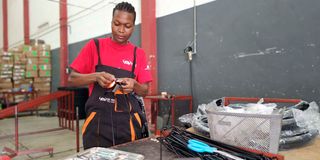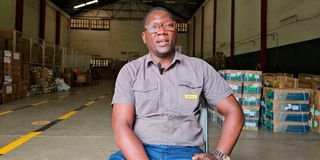The bicycle that changed everything: from 20km walks to engineering dreams

Stellah Atieno Otieno assembles a bicycle at the World Bicycle Relief warehouse in Kisumu on June 20, 2025. The organisation had earlier donated a bicycle to her, which boosted her academic performance, and eventually led to her employment at there.
What you need to know:
- Stellah Atieno Otieno walked 20 kilometres to school daily, leaving her exhausted, unsafe, and struggling academically.
- In 2016, she received a bicycle whilst in Form Two, transforming her routine and enabling her grades to improve to C+ level.
Before dawn broke over the hills of Nyakach in Kisumu County, Stellah Atieno Otieno was already awake. Not to revise for exams or complete her homework, but to prepare for a 20-kilometre walk to school.
The trek was not only exhausting but unsafe, a daily battle that drained her energy and crippled her academic performance.
Daily struggle
"We were expected at school by 6:30am, and I tried to get there on time, but not always," she recalls.
"Some days my body was simply too tired. I'd be exhausted. Once lessons began, my mind wasn't settled—I'd catch up after an hour."
The journey wasn't just physically demanding; it posed real dangers for a young woman walking alone.
"Some days were terrible. I remember once, on my way to school, some bad guys chased me. Luckily, I ran fast enough and they didn't catch me."
When school ended at 5pm, her focus shifted from education to survival.
"I just wanted to get home before dark," she says. "Not to do homework. Once home, chores were waiting."
The exhausting routine left no room for academic success. She would run home, already drained from the day's journey.
"By the time I got there, I had to start the house chores. I'd finish around 9pm, too tired to do anything else but sleep."
With no time to revise, no proper rest, and barely able to concentrate in class, her academic performance suffered. "I was getting D grades, and yet I knew I was capable of better," she says with conviction.
Everything changed in 2016.
Stellah was in Form Two when her school received a donation of ergonomic bicycles from World Bicycle Relief (WBR). She was one of the students selected to benefit from what would prove to be a life-changing gift.
"Unlike standard bicycles, these were smooth to ride and not too tall, so they weren't tiring," she explains.
"The tyres are built for rough, rocky, or muddy roads, and they don't puncture easily like ordinary rubber-wheeled bikes."
The bicycle transformed her daily routine completely.
"I'd ride very fast, just 45 minutes to school or back home. My elder brother owned a standard bike and taught me how to ride. And in Kisumu, it's not unusual for women to ride. It's normal," she says.

Patrick Wanyama, the operations manager at the World Bicycle Relief warehouse in Kisumu, on June 25, 2025. He says Stellah has proven that women can be engineers, even in bicycle assembly.
With the bicycle, Stellah could finally create a manageable schedule that allowed time for study, rest, and responsibilities.
"With the bike, I started waking up at 4:30am, studying until 5:15am, then preparing for school. In the evenings, I could stay in school until 6pm, do chores by 9pm, then study until 11pm."
Freed from the daily physical strain, her grades began to improve dramatically.
"I moved from a D to a C+, sometimes a C−," she says.
The bicycle also opened up opportunities for collaborative learning that had previously been impossible.
"Before the bike, I'd leave school as soon as the bell rang. I couldn't stay for group discussions like the others who lived nearby. But now, I could stay back and revise with them."
From student to professional
When Stellah sat for her Kenya Certificate of Secondary Education, she scored a C plain and gained admission to Kisumu National Polytechnic, where she pursued a certificate in building technology and later a diploma in the same field.
After completing her studies in 2024, she knew exactly where to begin her job search. Her first call was to WBR—the very organisation that had transformed her life.
She was accepted, first as an intern, then as a full-time employee, joining an all-male team of bicycle assemblers at the WBR warehouse in Kisumu
"I feel good. My colleagues are friendly. I enjoy working with them," she says.
Now working as an engineer, Stellah has become a role model for other young women facing similar challenges.
"I want to show others it's possible. Women can be engineers, mechanics... builders," she says.
Patrick Wanyama, the warehouse operations manager, has witnessed her journey from student to professional.
"Stellah came to us after finishing college and volunteered as an intern," he says. "She's a quick learner and has proven that women can be engineers, even in bicycle assembly."
Today, Stellah assembles the same type of bicycles that changed her life, creating opportunities for other students facing the challenges she once knew.

